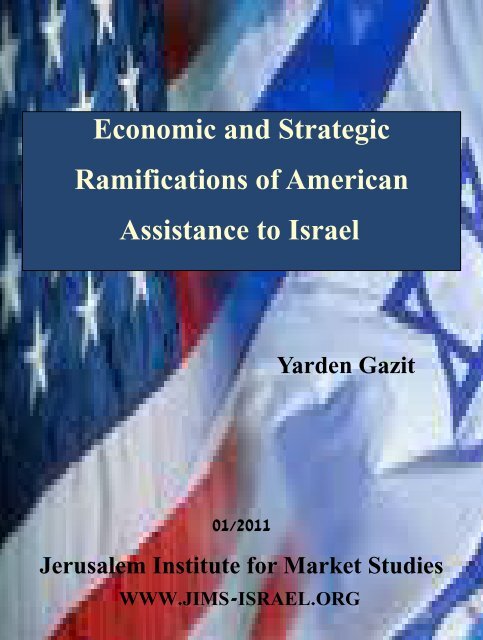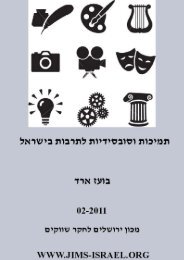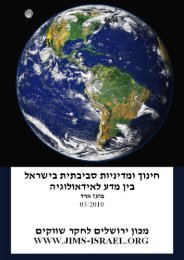Economic and Strategic Ramifications of American Assistance to Israel
Economic and Strategic Ramifications of American Assistance to Israel
Economic and Strategic Ramifications of American Assistance to Israel
Create successful ePaper yourself
Turn your PDF publications into a flip-book with our unique Google optimized e-Paper software.
<strong>Economic</strong> <strong>and</strong> <strong>Strategic</strong><br />
<strong>Ramifications</strong> <strong>of</strong> <strong>American</strong><br />
<strong>Assistance</strong> <strong>to</strong> <strong>Israel</strong><br />
Yarden Gazit<br />
01/2011<br />
Jerusalem Institute for Market Studies<br />
WWW.JIMS-ISRAEL.ORG
<strong>Economic</strong> <strong>and</strong> <strong>Strategic</strong> <strong>Ramifications</strong> <strong>of</strong> <strong>American</strong> <strong>Assistance</strong> <strong>to</strong> <strong>Israel</strong><br />
Yarden Gazit<br />
The debate surrounding the mora<strong>to</strong>rium on building in the settlements <strong>of</strong> Judea <strong>and</strong><br />
Samaria exposed the problematic nature <strong>of</strong> America’s aid <strong>to</strong> <strong>Israel</strong> <strong>and</strong> its impact on the<br />
public agenda. Whether one’s opinion is that a settlement freeze would be contrary <strong>to</strong><br />
<strong>Israel</strong>'s best interest or not, major policy decisions <strong>of</strong> this kind should not be based on a<br />
sense <strong>of</strong> reciprocity, such as compensation <strong>Israel</strong> might seek from the United States in<br />
return for freezing construction. Yet a great many people do not appreciate the real costs<br />
<strong>of</strong> America’s assistance <strong>to</strong> <strong>Israel</strong>. This paper presents the ramifications <strong>of</strong> this aid on<br />
<strong>Israel</strong>’s economy, followed by an examination from a strategic perspective.<br />
Background<br />
<strong>Israel</strong> has received over 110 billion dollars in <strong>American</strong> financial assistance since its<br />
establishment as a state, an amount which does not include guarantees or <strong>American</strong><br />
military emergency equipment s<strong>to</strong>red in <strong>Israel</strong>. 1 Unlike <strong>American</strong> assistance <strong>to</strong> other<br />
countries which is paid in installments throughout the year, assistance <strong>to</strong> <strong>Israel</strong> is<br />
transferred in the first month <strong>of</strong> the financial year, allowing <strong>Israel</strong> <strong>to</strong> benefit from accrued<br />
interest as well. In 2011, <strong>American</strong> assistance will comprise some 24% <strong>of</strong> <strong>Israel</strong>’s<br />
security budget, 4% <strong>of</strong> the country’s <strong>to</strong>tal budget <strong>and</strong> approximately 1.5% <strong>of</strong> the GDP. 2<br />
According <strong>to</strong> the most recent bilateral agreement, signed in 2007, <strong>Israel</strong> is expected <strong>to</strong><br />
receive some three billion dollars in annual military assistance for the next decade,<br />
ending in 2018. All <strong>American</strong> assistance <strong>to</strong> <strong>Israel</strong>, as <strong>of</strong> 2008, is military in nature. This<br />
is the case since the agreement signed by the first Netanyahu government <strong>and</strong> the Clin<strong>to</strong>n<br />
administration in the 1990’s, in which the US Government ceased providing civilian<br />
assistance <strong>to</strong> <strong>Israel</strong>. Seventy five per-cent <strong>of</strong> this military assistance must be allocated <strong>to</strong><br />
US-based purchases <strong>and</strong> the remainder may be designated <strong>to</strong>ward acquisitions in <strong>Israel</strong> or<br />
from other countries.<br />
1 Sharp, Jeremy. US Foreign Aid <strong>to</strong> <strong>Israel</strong>, Washing<strong>to</strong>n: Congressional Research Service 2010, p. 24.<br />
2 Based on Ministry <strong>of</strong> Finance projections <strong>and</strong> budget proposal.
2<br />
<strong>Economic</strong> <strong>Ramifications</strong> <strong>of</strong> <strong>American</strong> Aid<br />
While on the face <strong>of</strong> it, three billion dollars <strong>of</strong> annual assistance seems fully<br />
advantageous, a closer look reveals not a few shortcomings.<br />
Assessing Actual Value<br />
To begin with, the <strong>to</strong>tal figure <strong>of</strong> this assistance does not represent its actual value <strong>to</strong> the<br />
defense establishment, due <strong>to</strong> the stipulation allocating much <strong>of</strong> the package <strong>to</strong>ward US<br />
acquisitions. Were <strong>Israel</strong>’s defense establishment free in selecting all its purchases, no<br />
doubt many would be made in the USA, but it is highly unlikely that they would amount<br />
<strong>to</strong> the <strong>to</strong>tal required seventy-five percent, 2.25 billion dollars. Less expensive equipment<br />
<strong>of</strong> perhaps even higher quality might be available in <strong>Israel</strong> or in other countries. But with<br />
the US-purchase budget so ample, <strong>and</strong> the shekel budget so limited, there is little leeway<br />
but <strong>to</strong> buy in the USA. In this sense, the cost <strong>of</strong> this equipment does not reflect its real<br />
value, since many <strong>of</strong> the same items could have been purchased at a lower price.<br />
In an interview several years ago, Shomron Dasht, Deputy CEO <strong>of</strong> <strong>Israel</strong>’s Military<br />
Industries, <strong>to</strong>ld researcher Erez Raphaeli that “The cost <strong>of</strong> the (<strong>American</strong>) raw materials<br />
is double that <strong>of</strong> the options available in <strong>Israel</strong> or Europe, upping the final cost by 20%.” 3<br />
Raphaeli also cited former IDF Chief <strong>of</strong> Staff Dan Halutz, who claimed:<br />
The shift <strong>to</strong> US products on the basis <strong>of</strong> currency rather than economic<br />
considerations is wasteful <strong>and</strong> works <strong>to</strong> <strong>Israel</strong>'s disadvantage. We’re buying<br />
equipment <strong>of</strong> lower quality than we could get in <strong>Israel</strong> <strong>and</strong> at a higher price. One<br />
example is the <strong>American</strong> “attack pod.” Despite the fact that Rafael [Rafael<br />
Advanced Defense Systems Ltd.] <strong>of</strong>fers a pod which is more suited <strong>to</strong> our needs<br />
<strong>and</strong> is cheaper (by half), without the shekel-currency budget, there was no option<br />
but <strong>to</strong> buy the US product. 4<br />
3 Raphaeli, Erez. “<strong>American</strong> Security <strong>Assistance</strong> <strong>to</strong> <strong>Israel</strong>: A New Discussion <strong>and</strong> Assessment,” (position<br />
paper, unpublished).<br />
4 Ibid.
3<br />
The full actual value <strong>of</strong> <strong>American</strong> assistance <strong>to</strong> <strong>Israel</strong>’s defense establishment is difficult<br />
<strong>to</strong> assess, yet Raphaeli pointed <strong>to</strong> a statement by former Minister <strong>of</strong> Defense Moshe<br />
Arens in 2001, that some 50% <strong>of</strong> the assistance would be spent outside <strong>of</strong> the United<br />
States were it possible. In other words, about one-third <strong>of</strong> <strong>Israel</strong>’s defense acquisitions in<br />
the US, some $750 million annually, is not economically justifiable. Raphaeli brought an<br />
additional assessment from David Vaish, former economic advisor <strong>to</strong> the Ministry <strong>of</strong><br />
Defense, who estimated that in 2001, the IDF would have elected <strong>to</strong> make some $400<br />
million <strong>of</strong> its military product purchases within <strong>Israel</strong>, but that these potential acquisitions<br />
were tabled due <strong>to</strong> the requirement <strong>to</strong> purchase US-made products – translating in<strong>to</strong> a<br />
$400 million loss for the <strong>Israel</strong>i economy. Since then, the value <strong>of</strong> those same products is<br />
50% higher, equivalent <strong>to</strong> some $600 million in <strong>to</strong>day’s terms. 5<br />
Hidden Costs<br />
With the Camp David accords, the United States inaugurated an assistance package <strong>to</strong><br />
Egypt, linking it <strong>to</strong> <strong>Israel</strong>’s, making the countries the two major recipients <strong>of</strong> US<br />
assistance over the years. Egypt’s military <strong>and</strong> economic assistance has maintained a<br />
consistent rate <strong>of</strong> 66 cents for every dollar <strong>Israel</strong> receives. 6 The reduction <strong>of</strong> aid <strong>to</strong> <strong>Israel</strong><br />
in the 1990’s brought a reduction <strong>of</strong> US aid <strong>to</strong> Egypt by a commensurate amount. 7<br />
His<strong>to</strong>ry <strong>and</strong> experience point <strong>to</strong> the likelihood <strong>of</strong> a continued correlation between aid <strong>to</strong><br />
the two countries, although no guarantee <strong>to</strong> this effect was ever signed.<br />
Jordan receives significant assistance from the US as well, with a projected $700 million<br />
in grants <strong>to</strong> the Hashemite Kingdom projected for 2011. This assistance dates back <strong>to</strong> the<br />
Jordan-<strong>Israel</strong> peace treaty <strong>and</strong> while it is not at the level <strong>of</strong> US assistance <strong>to</strong> either <strong>Israel</strong><br />
or Egypt, it is one <strong>of</strong> the largest US aid packages granted <strong>to</strong> any foreign country. Grants<br />
<strong>to</strong> Egypt <strong>and</strong> Jordan are not all designated as military, in contrast <strong>to</strong> <strong>Israel</strong>. Yet in effect,<br />
this difference is immaterial, since designating funds for civilian use frees available<br />
allocations <strong>to</strong>ward military purposes.<br />
5 Nominal calculation.<br />
6 Sharp, US Foreign Aid <strong>to</strong> <strong>Israel</strong>, p. 22.<br />
7 Sharp, Jeremy, US Foreign <strong>Assistance</strong> <strong>to</strong> the Middle East: His<strong>to</strong>rical Background, Recent Trends <strong>and</strong> the<br />
FY 2011 Request, Washing<strong>to</strong>n; Congressional Research Service, 2010, p. 5.
4<br />
<strong>Israel</strong>’s peace treaties with Egypt <strong>and</strong> Jordan lower the likelihood <strong>of</strong> war between them,<br />
yet the IDF must nevertheless invest considerable resources in maintaining battle<br />
readiness in the event <strong>of</strong> an outbreak <strong>of</strong> hostilities. The “cold peace” with Egypt, coupled<br />
with the fact that it borders no country other than <strong>Israel</strong> which has a strong army, has left<br />
Egypt free <strong>to</strong> develop its modern efficient army. In addition, the great uncertainty<br />
regarding the country’s foreign policy in the aftermath <strong>of</strong> the Mubarak era means that the<br />
IDF must be prepared for any eventuality – even one <strong>of</strong> very low probability – <strong>of</strong> a<br />
defensive war on either the Egyptian or the Jordanian front.<br />
The stronger Egypt’s <strong>and</strong> Jordan’s armies become, the more resources <strong>Israel</strong> must direct<br />
<strong>to</strong>ward countering the potential threat. With <strong>Israel</strong>’s comparative disadvantage in terms <strong>of</strong><br />
relative population (over ten Egyptians for every <strong>Israel</strong>i), maintaining a qualitative<br />
advantage in equipment <strong>and</strong> weaponry is critical. Therefore, for every military purchase<br />
<strong>of</strong> Egypt’s, <strong>Israel</strong> must spend a greater amount in order <strong>to</strong> maintain the balance <strong>of</strong> power.<br />
Raphaeli estimated in 2005 that for each dollar <strong>of</strong> military aid <strong>to</strong> Egypt, <strong>Israel</strong> must spend<br />
between 1.6 <strong>and</strong> 2.1 dollars in order <strong>to</strong> maintain its qualitative military advantage, yet<br />
receives only 1.5 dollars for every dollar invested in Egypt. Some <strong>of</strong> the resources<br />
invested in order <strong>to</strong> stave <strong>of</strong>f a potential Egyptian threat are deployed on other fronts as<br />
well. Raphaeli estimated that for every dollar <strong>of</strong> <strong>American</strong> aid <strong>to</strong> neighboring countries<br />
which translates in<strong>to</strong> support for their armies, <strong>Israel</strong> needs <strong>to</strong> spend between 1.3 <strong>and</strong> 1.4<br />
dollars in order <strong>to</strong> preserve the balance. In this sense, <strong>Israel</strong> has a lower return on<br />
investment than Egypt for every dollar spent, due <strong>to</strong> the greater amount <strong>of</strong> military goods<br />
it must acquire. Not only does <strong>American</strong> assistance not provide <strong>Israel</strong> with an economic<br />
advantage, it requires <strong>Israel</strong> <strong>to</strong> expend additional amounts from its own internal security<br />
reserves.<br />
The benefits <strong>of</strong> <strong>Israel</strong>’s grant are thus greatly diminished, <strong>and</strong> perhaps canceled out<br />
al<strong>to</strong>gether, if weighed beside the costs which accompany America's aid <strong>to</strong> <strong>Israel</strong>’s<br />
neighbors.
5<br />
Undercutting <strong>Israel</strong>’s Military Industry<br />
<strong>Israel</strong> is among the leading arms manufacturers in the world, with arms exports forming<br />
an important component <strong>of</strong> its economy. Collaboration between <strong>Israel</strong> <strong>and</strong> the United<br />
States contributed <strong>to</strong> the growth <strong>of</strong> <strong>Israel</strong>’s arms industry, yet <strong>American</strong> assistance <strong>to</strong><br />
<strong>Israel</strong> undercuts its success.<br />
As noted above, a large proportion <strong>of</strong> America’s assistance must be spent on <strong>American</strong><br />
weapons, so that <strong>Israel</strong> cannot base its choices solely upon cost or quality. Whereas<br />
<strong>American</strong> equipment is purchased as part <strong>of</strong> the assistance package budget, <strong>Israel</strong>i-made<br />
arms are purchased from a separate pocket, that <strong>of</strong> the <strong>Israel</strong>i tax payer. This acts against<br />
<strong>Israel</strong>’s arms industry on a number <strong>of</strong> levels:<br />
To begin, as inferred earlier, <strong>Israel</strong>’s arms industry loses out on valuable contracts with<br />
the IDF, which must opt for purchasing equivalent goods from the US. Second,<br />
according <strong>to</strong> Dasht, <strong>Israel</strong>i arms suppliers are required <strong>to</strong> purchase raw materials in the<br />
US as well, which are more expensive, thus raising the costs <strong>of</strong> the end product <strong>and</strong><br />
making it difficult for <strong>Israel</strong>i industry <strong>to</strong> compete with foreign manufacturers. Third, due<br />
<strong>to</strong> <strong>Israel</strong>’s reputation as a military power, any acquisition choice <strong>of</strong> <strong>Israel</strong>’s will instantly<br />
increase the dem<strong>and</strong> for that product on the international market. When a foreign country<br />
contemplates a purchase from an <strong>Israel</strong>i arms manufacturer, the question <strong>of</strong> whether<br />
<strong>Israel</strong>’s own army uses that product <strong>of</strong>ten plays in<strong>to</strong> the decision. Accordingly, every<br />
time <strong>Israel</strong> opts for an <strong>American</strong>-made product over one <strong>of</strong> its own is a strike against the<br />
added value which its industry’s reputation would have gained had it supplied the item <strong>to</strong><br />
the IDF.<br />
This is not <strong>to</strong> say that the <strong>Israel</strong> Defense Forces ought <strong>to</strong> purchase <strong>Israel</strong>i products in<br />
order <strong>to</strong> boost the local economy or the industry’s image. The IDF’s role is <strong>to</strong> defend the<br />
State <strong>of</strong> <strong>Israel</strong>, <strong>and</strong> should purchase the highest quality <strong>and</strong> most effective equipment in<br />
order <strong>to</strong> fulfill that mission. However, when arms purchase decisions are made not on the
6<br />
basis <strong>of</strong> quality or cost effectiveness but on external constraints, there is a negative fallout<br />
effect on local industry.<br />
Further, the United States places restrictions on <strong>Israel</strong> when it comes <strong>to</strong> its exports <strong>to</strong><br />
other countries. Large scale business deals have been cancelled or scuttled due <strong>to</strong><br />
<strong>American</strong> pressure on <strong>Israel</strong> not <strong>to</strong> sell arms <strong>to</strong> countries which the US considers <strong>to</strong> be<br />
adversaries. The best known such case was <strong>Israel</strong>’s “Falcon” deal with China in 2000.<br />
<strong>Israel</strong> was forced <strong>to</strong> cancel a deal worth hundreds <strong>of</strong> millions <strong>of</strong> dollars – in addition <strong>to</strong><br />
paying damages <strong>to</strong> China – following threats <strong>of</strong> aid cuts from the US Congress. The<br />
establishment <strong>of</strong> a “consultation” process with the United States in the aftermath <strong>of</strong> the<br />
Falcon affair, further compromised <strong>Israel</strong>’s independence in arms exports. In the absence<br />
<strong>of</strong> <strong>American</strong> assistance, America might not have leaned so hard on <strong>Israel</strong> not <strong>to</strong> sell arms<br />
<strong>to</strong> China; <strong>Israel</strong> might have given in regardless, in its desire <strong>to</strong> safeguard its relationship<br />
with its important ally. In either case, however, <strong>American</strong> assistance places pressure on<br />
<strong>Israel</strong> in this area, with the resulting economic loss.<br />
Perpetuating Irresponsible <strong>Israel</strong>i <strong>Economic</strong> Policy<br />
America’s assistance <strong>to</strong> <strong>Israel</strong> comes independent <strong>of</strong> fluctuations in the <strong>Israel</strong>i economy.<br />
One might say that it forms the most reliable source <strong>of</strong> all State revenues. This fact led<br />
Roni Bart <strong>of</strong> the Institute for National Security Research <strong>to</strong> claim that “the defense<br />
establishment rightly views this financial assistance as the single most permanent long<br />
term item in its budget planning, a fac<strong>to</strong>r which is immune <strong>to</strong> political disruption, <strong>and</strong> is<br />
therefore best left alone.” 8 This situation leaves the system with no incentive <strong>to</strong> become<br />
more efficient. As former Prime Minister Ehud Olmert noted in December 2010, “We<br />
can <strong>and</strong> should decrease our defense budget <strong>and</strong> this would have no negative effect on<br />
any <strong>of</strong> the objectives with which the State <strong>of</strong> <strong>Israel</strong> needs <strong>to</strong> content in order <strong>to</strong> protect<br />
<strong>Israel</strong>’s vital interests, including facing the most hostile <strong>of</strong> our enemies.” 9 But when a<br />
8 Bart, Roni, “<strong>American</strong> Aid <strong>to</strong> <strong>Israel</strong>: A Reevaluation,” <strong>Strategic</strong> Update, Institute for National Security<br />
Studies, Tel Aviv (June, 2007), http://www.inss.org.il/upload/(FILE)1193575818.pdf .<br />
9 Calcalist December 9, 2010, http://www.calcalist.co.il/money/articles/0.7340.L-<br />
4335001.00.html?dcRef=ynet
7<br />
great proportion <strong>of</strong> this budget comes from a foreign source, the incentive <strong>to</strong> increase<br />
efficiency drops.<br />
When a government wishes <strong>to</strong> increase its budget, it must advance reforms <strong>to</strong> encourage<br />
economic growth <strong>and</strong> which, in turn, will increase the tax base <strong>and</strong> tax revenues. The<br />
alternative, raising taxes without broadening the tax base, is not sustainable in a<br />
competitive global economy. Such growth-incentive reforms generally need <strong>to</strong> overcome<br />
opposition that is either political or institutionally-based. Politicians will generally opt<br />
for relying on foreign assistance over the prospect <strong>of</strong> political turbulence.<br />
Harming the Private Sec<strong>to</strong>r<br />
As noted, <strong>American</strong> assistance is not linked <strong>to</strong> the <strong>Israel</strong>i market <strong>and</strong> is granted <strong>to</strong> the<br />
public sec<strong>to</strong>r. Without this aid, it st<strong>and</strong>s <strong>to</strong> reason that the government would be forced<br />
<strong>to</strong> reduce the public sec<strong>to</strong>r in size, through defense budget cuts, restructuring <strong>and</strong><br />
increased efficiency in other frameworks. This would direct many more resources<br />
<strong>to</strong>ward the private sec<strong>to</strong>r, which would be motivated <strong>to</strong> seek creative <strong>and</strong> growth-oriented<br />
solutions, involving personnel, financing, as well as l<strong>and</strong> <strong>and</strong> other resources currently<br />
held by the government.<br />
These challenges <strong>and</strong> opportunities would pass <strong>to</strong> private sec<strong>to</strong>r h<strong>and</strong>s were it not for<br />
<strong>American</strong> assistance. Instead <strong>of</strong> helping advance the <strong>Israel</strong>i market, it acts <strong>to</strong> obstruct<br />
economic growth <strong>and</strong> promotes its stagnation.<br />
<strong>Strategic</strong> Implications<br />
The above illustrates that <strong>Israel</strong>’s economy would grow were it <strong>to</strong> go without <strong>American</strong><br />
assistance grants, or at the very least, would not suffer any significant damage.<br />
Examining this issue from a strategic st<strong>and</strong>point brings equally illuminating observations.<br />
Limiting <strong>Israel</strong>’s Diplomatic Freedom<br />
As we have seen, <strong>American</strong> assistance <strong>to</strong> <strong>Israel</strong> is not unconditional <strong>and</strong> comes with<br />
numerous strings attached. One such string is that by accepting this aid, <strong>Israel</strong> identifies
8<br />
itself with America’s foreign policy <strong>and</strong> limits <strong>Israel</strong>’s ability <strong>to</strong> pursue alliances with<br />
other countries. The Falcon episode with China forms an excellent case study. In addition<br />
<strong>to</strong> the financial cost <strong>of</strong> cancelling the deal, this move damaged <strong>Israel</strong>-Sino relations.<br />
China’s growing role as a superpower, not <strong>to</strong> mention its ve<strong>to</strong> privileges in the UN<br />
Security Council, bring it great strategic importance from <strong>Israel</strong>’s perspective. <strong>Israel</strong>, a<br />
small country, cannot affect the policies <strong>of</strong> a superpower like China’s on its own. If <strong>and</strong><br />
when it was <strong>to</strong> ask China for its assistance, China would not be likely <strong>to</strong> overlook the<br />
Falcon incident. Although <strong>Israel</strong> might well refrain from selling arms <strong>to</strong> a given country<br />
due <strong>to</strong> US pressure even without the <strong>American</strong> aid package, the US would nevertheless<br />
have less leverage <strong>to</strong> employ, leaving <strong>Israel</strong> with somewhat greater flexibility in<br />
cultivating new alliances.<br />
Likewise, <strong>Israel</strong> votes in au<strong>to</strong>matic step with <strong>American</strong> positions on all issues in the<br />
United Nations <strong>and</strong> other international bodies. <strong>Israel</strong> thus has found itself among<br />
practically the only countries in the world which votes with the US in favor <strong>of</strong> sanctions<br />
on Cuba, for example. On <strong>to</strong>p <strong>of</strong> the ever-present hostility <strong>to</strong> which <strong>Israel</strong> is subjected<br />
due <strong>to</strong> the Arab-<strong>Israel</strong>i conflict, these ties draw added anti-<strong>American</strong> sentiment prevalent<br />
in many regions, including the Middle East. Here <strong>to</strong>o, ending <strong>American</strong> aid would not<br />
necessarily mean the end <strong>of</strong> <strong>Israel</strong>’s support for US positions, but it would mark an<br />
essential step <strong>to</strong>ward independence.<br />
Strengthening Neighboring Au<strong>to</strong>cracies<br />
As already noted, military aid <strong>to</strong> <strong>Israel</strong> comes as part <strong>of</strong> an aid package <strong>to</strong> Egypt <strong>and</strong><br />
Jordan. In addition <strong>to</strong> the economic burden this foists on <strong>Israel</strong>, the aid <strong>to</strong> these<br />
neighboring countries causes it long term strategic damage.<br />
Unlike <strong>Israel</strong>, the Egyptian regime uses the army <strong>to</strong> maintain its hold on power, abusing<br />
human rights <strong>and</strong> oppressing opposition movements in the process. Since having the<br />
Moslem Brotherhood opposition in power is thought <strong>to</strong> be worse for <strong>Israel</strong> than the<br />
Mubarak regime, <strong>Israel</strong> is said <strong>to</strong> better <strong>of</strong>f favoring the regime’s survival. Yet Mubarak,<br />
through the army, has quashed liberal opposition movements, leaving the Moslem
9<br />
Brotherhood as the main opposition movement. In addition, the theory that Egypt can be<br />
“enticed” <strong>to</strong> maintain its peace agreement with <strong>Israel</strong> over time is far from certain; there<br />
is always a looming chance that it will act otherwise in accordance with its perceived<br />
geopolitical interests.<br />
Creating an Image <strong>of</strong> Weakness<br />
<strong>American</strong> aid fosters the image <strong>of</strong> a weak <strong>Israel</strong> vis à vis its neighbors. Leaders <strong>of</strong> the<br />
Zionist movement from both sides <strong>of</strong> the political map emphasized how vital it is that<br />
<strong>Israel</strong> have the ability <strong>to</strong> defend itself on its own. In his famous article on the “iron wall,”<br />
referring <strong>to</strong> Jewish determination <strong>and</strong> resolve, Vladimir Ze’ev Jabotinsky claimed that<br />
“as long as the Arabs have even the slightest hope <strong>of</strong> eliminating us, they will not give up<br />
that hope” unless <strong>and</strong> until “they see not a single crack in the iron wall.” Moshe<br />
Beilinson, a founder <strong>of</strong> the left-wing newspaper Davar, expressed a similar viewpoint<br />
when he wrote,<br />
Until when, they say, until when? Until the time that <strong>Israel</strong>’s strength will<br />
overcome any enemy attack, whatever its source; until the most driven <strong>and</strong> the<br />
most daring <strong>of</strong> all the enemy camps, wherever they are, will know: There is<br />
nothing that can break <strong>Israel</strong>’s strength within its l<strong>and</strong>, for the imperative <strong>and</strong> the<br />
truth <strong>of</strong> life is on our side, <strong>and</strong> they can do nothing but make peace with that<br />
knowledge. That is the objective <strong>of</strong> this campaign. 10<br />
America’s aid <strong>to</strong> <strong>Israel</strong> may not form a tipping point in the balance <strong>of</strong> power in the<br />
Middle East, yet the impression <strong>of</strong> <strong>Israel</strong> as dependent upon it encourages radical<br />
elements, or “cracks” in the “iron wall.” As long as hostile elements have hope that the<br />
end <strong>of</strong> that aid would provide a decisive advantage for them against <strong>Israel</strong>, they will do<br />
everything <strong>to</strong> drive a wedge between <strong>Israel</strong> <strong>and</strong> the United States by portraying <strong>Israel</strong> as<br />
an entity state whose actions run contrary <strong>to</strong> <strong>American</strong> values <strong>and</strong> interests. If they were<br />
<strong>to</strong> see <strong>Israel</strong> defend itself fully on its own, without reliance on foreign assistance, their<br />
incentive <strong>to</strong> do so would lessen.<br />
In addition, as US leaders make a point <strong>of</strong> noting from time <strong>to</strong> time, <strong>American</strong> aid is<br />
considered an expression <strong>of</strong> America’s commitment <strong>to</strong> <strong>Israel</strong>’s security <strong>and</strong> that this<br />
10 Beilinson, Moshe, “The Goal <strong>of</strong> this Campaign,” Davar. June 23, 1936,
10<br />
commitment acts as a deterrent <strong>to</strong> <strong>Israel</strong>’s enemies. If the United States was at some<br />
point <strong>to</strong> make a unilateral decision <strong>to</strong> s<strong>to</strong>p its assistance, whether due <strong>to</strong> diplomatic<br />
tensions with <strong>Israel</strong> or <strong>to</strong> an economic crisis, this would be seen as back-pedaling from its<br />
commitment <strong>to</strong> <strong>Israel</strong>’s wellbeing, thus encouraging <strong>Israel</strong>’s enemies <strong>and</strong> weakening<br />
<strong>Israel</strong> even more. However, if the same move was the outcome <strong>of</strong> an agreement between<br />
the two countries, at <strong>Israel</strong>’s initiative, <strong>Israel</strong>’s situation would not be impaired. The aid<br />
reduction in the 1990’s, for instance, which <strong>to</strong>ok this form, did nothing <strong>to</strong> dent the<br />
unwritten alliance between the United States <strong>and</strong> <strong>Israel</strong>.<br />
Curbing <strong>Israel</strong>’s Sovereignty <strong>and</strong> its Leaders’ Accountability<br />
The very act <strong>of</strong> accepting <strong>American</strong> assistance impairs <strong>Israel</strong>i democracy <strong>and</strong><br />
sovereignty. When a country receives a sizable portion <strong>of</strong> its revenues from sources<br />
other than taxpayer money (whether from its natural resources or from foreign aid),<br />
policy makers have no incentives <strong>to</strong> act in accordance with citizens’ interests or <strong>to</strong><br />
advance the economy. This is known as the “curse <strong>of</strong> resources,” a situation in which the<br />
higher the state’s income from natural resources, the less the country is free. The<br />
political survival <strong>of</strong> leaders in countries like Venezuela, Iran, Saudi Arabia <strong>and</strong> Russia,<br />
for example, depends more on the price <strong>of</strong> oil than on the achievements <strong>of</strong> its educational<br />
system or the freedom <strong>of</strong> its citizens.<br />
When it comes <strong>to</strong> foreign aid, the result is a compounded dis<strong>to</strong>rtion. Countries receiving<br />
humanitarian aid are continuously required <strong>to</strong> demonstrate their weakness <strong>and</strong> inability <strong>to</strong><br />
care for their citizens in order <strong>to</strong> qualify for ongoing aid. Thus, instead <strong>of</strong> <strong>Israel</strong>’s leaders<br />
seeing their job as building <strong>Israel</strong>’s capacity <strong>to</strong> defend itself, the defense system <strong>and</strong><br />
military industry are guided by interests <strong>to</strong> preserve <strong>Israel</strong>’s vulnerability as the<br />
prerequisite for more <strong>American</strong> aid.<br />
Cultivating a Culture <strong>of</strong> Dependence<br />
The Government <strong>of</strong> <strong>Israel</strong>’s reliance on the <strong>American</strong> taxpayer sets a negative example<br />
which acts <strong>to</strong> encourage a culture <strong>of</strong> dependence. The Government invests many<br />
resources in encouraging citizens <strong>to</strong> join the workforce <strong>and</strong> in ex<strong>to</strong>lling initiative <strong>and</strong>
11<br />
entrepreneurship. Yet when a country like <strong>Israel</strong>, with its highly developed cutting-edge<br />
market, can live <strong>of</strong>f someone else’s tab, these state-backed initiatives lack moral<br />
st<strong>and</strong>ing. In cultivating a culture <strong>of</strong> dependence, the Government <strong>of</strong> <strong>Israel</strong> causes<br />
incalculable damage <strong>to</strong> <strong>Israel</strong>i society.<br />
Short <strong>and</strong> Long-Term Projections<br />
Projections for the coming decades predict that the economic <strong>and</strong> strategic damage <strong>to</strong><br />
<strong>Israel</strong> as an outcome <strong>of</strong> <strong>American</strong> aid will only increase.<br />
The global economic crisis, added <strong>to</strong> the policies <strong>of</strong> the Bush <strong>and</strong> Obama administrations,<br />
have placed America heavily in debt, with forecasts <strong>of</strong> slow growth <strong>and</strong> continued high<br />
unemployment. Most economic indica<strong>to</strong>rs show <strong>Israel</strong>’s position as better than<br />
America’s, with unemployment in America at 9.8%, versus 6.6% in <strong>Israel</strong>. US debt-<strong>to</strong>-<br />
GDP ratio st<strong>and</strong>s at 94% compared <strong>to</strong> 79% in <strong>Israel</strong> <strong>and</strong> the US Government deficit<br />
exceeds productivity by 10%, more than double the <strong>Israel</strong>i rate.<br />
All this will oblige the <strong>American</strong> taxpayer <strong>to</strong> change its spendthrift ways <strong>and</strong> tighten its<br />
belt. Indeed, the main issue <strong>of</strong> the November 2010 Congressional elections was<br />
government waste <strong>of</strong> taxpayer dollars. The main, perhaps sole, plank <strong>of</strong> the “Tea Party”<br />
platform, which gained much power in those elections, was a call <strong>to</strong> reduce government<br />
spending. At a certain point, US taxpayers may ask themselves why they should be<br />
subsidizing a developed country like <strong>Israel</strong>.<br />
Moreover, many commenta<strong>to</strong>rs believe that America’s st<strong>and</strong>ing <strong>and</strong> its ability <strong>to</strong><br />
influence policies <strong>of</strong> other countries is in decline. This process stems from the economic<br />
crisis, America’s military involvement in Iraq <strong>and</strong> Afghanistan along with the rapid<br />
growth <strong>of</strong> rising powers such as China, India <strong>and</strong> Brazil. America will continue <strong>to</strong> hold<br />
immense power on the international stage for decades <strong>to</strong> come, certainly, yet <strong>Israel</strong>’s<br />
need <strong>to</strong> develop alliances with other countries will take on increased importance.<br />
Summary
12<br />
The extensive economic <strong>and</strong> strategic damage wrought by America’s financial assistance<br />
<strong>to</strong> <strong>Israel</strong> cannot be assessed with full accuracy until <strong>Israel</strong> disconnects itself from it<br />
entirely. Based on economic <strong>and</strong> geopolitical projections, this aid is bound <strong>to</strong> undergo<br />
changes, while its damaging effects will only worsen. <strong>Israel</strong> would be well served if the<br />
Government acts <strong>to</strong> pre-empt the inevitable <strong>and</strong> initiate a disengagement.










